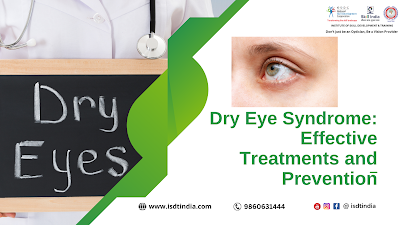Dry Eye Syndrome: Effective Treatments and Prevention
Dry eye syndrome is a common condition that affects millions of people worldwide, causing discomfort and irritation. Understanding its symptoms, treatments, and prevention methods can help individuals manage the condition effectively and improve their overall eye health.
Recognizing Dry Eye Symptoms
- Dryness: Persistent dryness or a feeling of grittiness in the eyes.
- Redness: Eyes may appear red or bloodshot due to inflammation.
- Irritation: Constant itching, burning, or stinging sensations in the eyes.
- Blurry Vision: Vision may become intermittently blurry or fluctuate in clarity.
- Sensitivity to Light: Increased sensitivity to light, known as photophobia.
- Watery Eyes: Paradoxically, some individuals may experience excessive tearing as a compensatory response to dryness.
Exploring Treatment Options
- Artificial Tears: Over-the-counter eye drops can provide temporary relief by lubricating the eyes.
- Prescription Medications: Prescription eye drops or ointments may be recommended to reduce inflammation and improve tear production.
- LipiFlow: This in-office procedure helps unclog blocked oil glands in the eyelids, enhancing tear quality.
- Punctal Plugs: Tiny plugs inserted into tear ducts can prevent tears from draining too quickly, keeping the eyes moist.
- Nutritional Supplements: Omega-3 fatty acids supplements may help improve tear quality and reduce inflammation.
- Eyelid Hygiene: Regularly cleaning the eyelids can help prevent blockages in the oil glands, improving tear composition.
Preventing Dry Eye Syndrome
- Blink Regularly: Take breaks during prolonged screen time to blink more frequently and prevent tears from evaporating too quickly.
- Use Humidifiers: Adding moisture to the air with humidifiers can help alleviate dryness, especially in dry indoor environments.
Wear Sunglasses: Protecting the eyes from wind, dust, and ultraviolet (UV) radiation with sunglasses can reduce irritation and dryness.- Stay Hydrated: Drinking an adequate amount of water throughout the day can help maintain tear production and eye moisture.
- Follow a Healthy Diet: Consuming foods rich in omega-3 fatty acids, vitamins A, C, and E, and antioxidants can support overall eye health.
Conclusion
Dry eye syndrome can significantly impact daily life and visual comfort. By recognizing the symptoms, exploring treatment options, and implementing preventive measures, individuals can effectively manage the condition and enjoy improved eye comfort and health.






Comments
Post a Comment